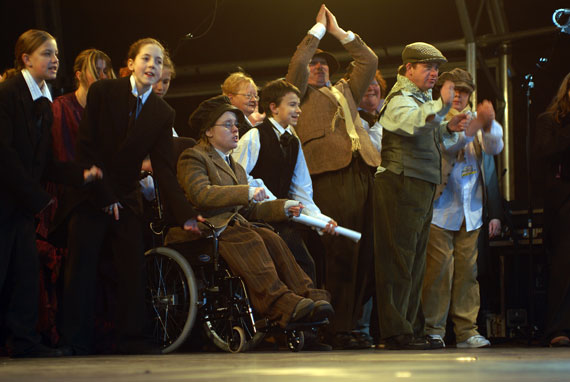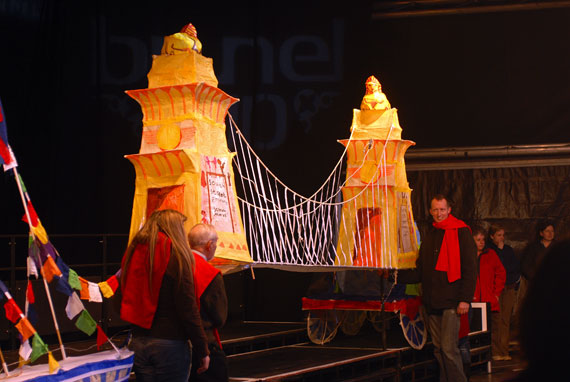|
|




The concept for the play was to embark on a 12-month project
involving people from excluded communities around Bristol in researching,
interpreting and celebrating the life and achievements of Isambard Kingdom
Brunel.
On the night of April 8 2006, the official launch weekend of
Brunel 200, a lantern-lit procession took the Castles
in the Air performers
through the large audience which had formed in Clifton, and onto the
stage, where the cast re-enacted an excerpt from their play depicting
Brunel and committee laying the foundation stone for the suspension bridge.
Castles
in the Air was a large-scale community play created by acta with hundreds
of people from all over Bristol. The play was devised by the people involved,
re-telling Brunel’s life story using theatre,
projections, visual art, with original music and songs by Shirley Pegna.
Participants included school-children, people with learning disabilities
and performers drawn from acta’s Bristol-wide network of youth
and community groups. Castles in the Air was performed at the L-shed,
and attracted large and appreciative audiences.
“Once again you have proven your immense talents with Castles
in the Air. I really don't know how you do it,
but you always manage to bring me to tears (in the best possible way).
I always feel the way you manage to bring so many ages and abilities
together and so clearly value every contribution is very humbling to
see. The stories are so well told, and the props fantastic. Having seen
many of your productions you still manage to surprise me every time.
All I can say is well done! And that seems so pathetic!”
Audience member

Making Castles in the Air by
Neil Beddow, Director, and Eve Houston, Drama Worker.
“We began to research Brunel, his life
and work, and were astonished and impressed beyond measure at the size
and extent of his achievements, and their continuing impact on our city,
indeed, on the world. We ploughed through books and biographies, and
were swamped with gauges and tonnage, acts of parliament and debates,
ups and downs, plans and schemes, railways and bridges and boats and
tunnels, until our heads were spinning. So much detail… too much
detail for a theatre presentation. The problem was, he just did too much!
Then, while researching for another project,
we discovered a fragment of a ghost story; how Brunel’s spirit
is seen to wander from Leigh Woods to the Clifton Suspension Bridge,
and stand, looking out across the Gorge. And it got us wondering why?
Why would such a man have a restless spirit, having achieved so much?
We began to ask questions, to look at the research again in a new light.
We found a thread to follow, the theme of Time – his apprenticeship
with the clockmaker Breuget, his maternal grandfather Thomas Mudge,
the famous chronologist, his punishing self-imposed work schedule.
Why did he work so hard? What was driving him? We had found a way in!
We began devising
the play with a small group of performers in June 2005, taking events
from Brunel’s life, and developing scenes.
We decided that the play should tell Isambard’s story at a fast
pace, reflecting the way he lived his life. The story would be told by
a central group of storytellers, strange, unreal characters who inhabit
his world, people who in their lives had some connection with the man – people
who worked for him, invested in him, loved or hated him.
In September the
group grew, and we began to work in Oldbury Court and St Mary Redcliffe
CEVC Primary schools, developing song lyrics with our musical director
Shirley Pegna. The devising process continued, and the script and songs
completed by late autumn.
The devising process was key to the way the play
developed. Usually when acta creates a community play, we start from
the experiences and knowledge of the participants, and build the story
from that. But with this show we already had the story, and for a while
we wondered what our performers would be able to put into the play.
However, we need not have been concerned. From the very first session
we found that our cast used their creativity to interpret the different
moments of Brunel’s
life, using movement and freeze frame, creating dialogue, bringing characters
to life, and above all, bringing a wonderful sense of humour and fun
to the process. This lightened the sometimes weighty and technical detail
we had to cover, and made the whole experience immensely enjoyable – we
do not know whether young Isambard had a nurse called Fifi, or a dog
called Rover, but we loved the imagination that suggested he did!
When the
script was complete, we cast around for more people to join our central
group of performers, and when rehearsals began in January wehad a team
of 26 people of all ages from all over Bristol. Rehearsals began with
the Misfits Theatre Company; and Weston Park, South Street and Gay
Elms Primary Schools got involved in making the giant lanterns for
the show.
Creating
the play was a real team effort; not only the many performers, but also
the artistic team at acta, designers, musicians, directors. We strove to
make the play full of fun, action, spectacle and event; not to try to tell
the whole story – there
are books to do that! No, our aim was to give an interpretation, a
flavour, a sense of the man. He did, after all, always long to be an
actor, and certainly used his flair for theatre and showmanship in
his life and works. We would like to think that Castles in the
Air was a fitting tribute to his restless
spirit.”

Audience analysis
| • |
555 total saw the show
over the four performances – 93% of capacity. |
| |
| • |
129 people completed audience questionnaires – 23%
of actual audience. |
| |
| • |
It was the first acta show ever
for 70% of the audience. |
| |
| • |
4 out of 5 people in the audience
were not regular theatre-goers – attend the theatre rarely,
or only a few times a year. |
| |
| • |
11% came as a direct result of
seeing a poster or direct leafleting. |
| |
| • |
When asked what they thought of
the show, 87% said it was brilliant.
(0% gave a negative comment
to this question). |
| |
| • |
76% said they would come to another
acta show. (0% said they would not). |
| |
| • |
6% of the audience consider themselves
to be disabled. |
| |
| • |
4% of the audience consider themselves
to be BME. |
Links
For further information about acta’s work,
visit their website at: www.acta.f2s.com.
Photography: Kevin Clifford.
| |